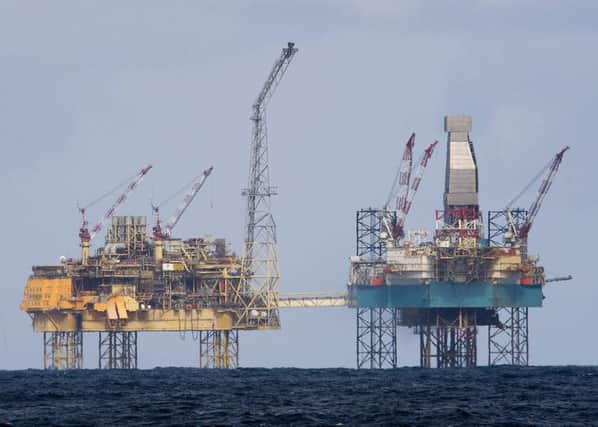North Sea oil industry warned it must '˜adapt to survive'


A new national strategy for Scotland’s oil and gas sector states that its costs are too high and that the industry must find a way of embracing the new marketplace.
Industry analysts Douglas Westwood said yesterday 146 rigs in UK waters could be scrapped over the next ten years – more than quarter of the current total.
Advertisement
Hide AdAdvertisement
Hide AdAnother consultancy, Wood Mackenzie, said that at recent prices one in seven barrels of oil being produced in UK waters is at a cash loss. It also said the UK is the country third most likely to see its fields permanently shut down as a result of low prices.
There are an estimated 22 billion barrels of oil and gas in the North Sea, but the current level of drilling has sunk to a 50-year low. An estimated 65,000 workers have been axed as a result of the tumbling global oil price over the past 18 months, but the Scottish Government has been accused of being slow to react to the crisis.
Energy minister Fergus Ewing will today unveil the new strategy for the next four years on a visit to a North Sea firm in Aberdeen.
The report, entitled Maximising Value, warns: “The industry is at a crucial point, where it must adapt to survive and thrive in a low global oil price scene, a changing commercial and regulatory environment and a maturing North Sea basin with fierce international competition for investment.”
Despite the widespread job losses over the past year, the report warns that worse is yet to come. It says: “There have been a significant number of job losses in recent times and unfortunately more are anticipated in the current environment.”
The blueprint says the industry can still thrive and that the value of its supply chain can increase from £22 billion to £30bn by the end of the decade.
Asia and the Middle East are seen as key overseas markets that could help boost international trade.
The supply chain covers almost all activity in the North Sea from well services, drilling contractors and pipe laying to engineering support, inspection services and subsea equipment. It also includes catering and facility management, recruitment and sea and air transport. In all the sector comprises about 1,500 firms.
Advertisement
Hide AdAdvertisement
Hide AdAt the heart of the new strategy is a drive to “transform” areas such as subsea testing and decommissioning of ageing rigs, which are seen as a key areas of growth in the future.
The strategy also sets out plans to see Scotland ranked in the top three countries globally in terms of innovation and technology development for the sector – even after North Sea oil has run dry.
It aims to see Scotland recognised as having “centres of excellence” in areas such as subsea, asset integrity, digital offshore and decommissioning.
But there is a warning this will mean major cuts. The strategic report states: “The investment required for the future can only be achieved by reducing costs and enhancing efficiency.”
Mr Ewing said: “While it is clear that the oil and gas industry faces severe challenges from a low global oil price, there are still opportunities that Scotland can capture from new discoveries and through our world-class supply chain.
“This strategy, which we committed to refresh in our most recent Programme for Government, builds on these themes, supporting the industry to maintain its global position and to drive forward the changes required to increase growth in international and supply chain sales and production efficiency.”
The strategy was drawn up by the Industry Leadership Group (ILG), which Mr Ewing chairs.
Scottish Green Party co-convener Patrick Harvie said: “We have no time to waste if we want our workers and our economy to benefit from the drive to decommission North Sea rigs. Whether our governments like it or not, the future of North Sea oil is more uncertain than ever, and thousands of people will lose their livelihoods unless we secure work in areas like decommissioning and renewables.”
Advertisement
Hide AdAdvertisement
Hide AdHe added: “It would be irresponsible, foolish and extremely short-sighted to let other countries seize the opportunities of decommissioning. The Scottish Government must urgently accelerate its efforts if we’re going to secure jobs in the sector and make sure that Scotland is ready to bid for contracts.”